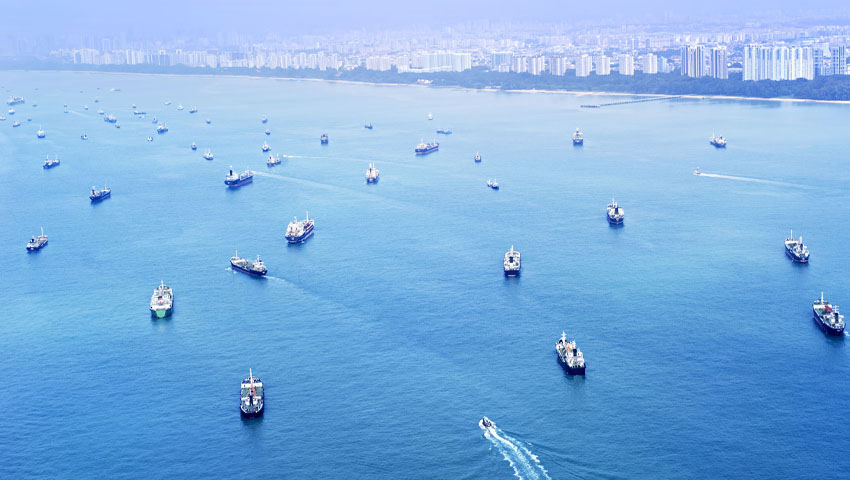The Indo-Pacific is indisputably a maritime orientated region with maritime choke points serving as key strategic and economic challenges for established and emerging economies alike. The Straits of Malacca is one of the busiest and strategically important waterways in the world.
To continue reading the rest of this article, please log in.
Create free account to get unlimited news articles and more!
For both Australia and the broader Indo-Pacific region, the Straits of Malacca, a narrow, 890-kilometre stretch of water between the Malay Peninsula and the Indonesian island of Sumatra, serves as the main shipping channel between the Indian and Pacific Oceans.
As one of the busiest waterways in the world, the Malacca Straits serve as a vital economic lifeline for the economies of China, Thailand, Indonesia, Vietnam, Singapore, Japan, Taiwan and South Korea.
On average, approximately 100,000 vessels pass through the straits annually, accounting for about a quarter of the world's traded goods, including the liquid and gas energy resources essential for the enduring success of the regional and, more broadly, the global economy. For Australia, the Straits of Malacca and Singapore in particular are responsible for the vast majority of the nation's liquid energy supplies, placing the waterway at the centre of the nation's national security engagement with the Indo-Pacific.
At its narrowest point of 2.7 kilometres, the Straits of Malacca have long been a haven for congested maritime trade and piracy – regional navies, including Australia, Indonesia, Malaysia and Singapore, have responded, combining forces to respond to the threats to the regional and global economy, highlighting the continued importance of the strategic waterway.
It is important to recognise the geographic realities of the straits and the surrounding archipelagos – providing dramatically different operating environments for traditional naval assets like destroyers, frigates and aircraft carriers and asymmetric platforms like fast attack boats, influencing a new era of hybrid naval warfare combining traditional fleet engagements and asymmetric warfare.
Geography limiting the capacity, tightening global supply
Despite the geographic confines of the Straits of Malacca, namely the shallow depth, which has a minimum depth of 25 metres, combined with the propensity for forest fires in both Indonesia and the Malay Peninsula, severely limit the capacity of the strategic waterway and impact the economic security and stability of the Indo-Pacific.
Recognising this, a number of the larger vessels are forced to divert through the deeper water channels of Sunda and Lombok, adding travel time between markets. In response, nations, namely China through the One Belt, One Road initiative, have sought to counter the strategic vulnerabilities presented by the Straits of Malacca through over-land pipelines and deep water ports further west, in Pakistan.
Meanwhile, nations including Thailand and Japan have sought to develop a second passage through the Kra Isthmus in the form of a canal to further reduce the strategic vulnerability of the Straits of Malacca – the proposed Kra Canal would serve to provide reliable, unhindered passage for the larger, Malaccamax vessels, while also reducing the travel time to market via the South China Sea.
Australia's role in strengthening the security of the straits
Further complicating the strategic environment is the increasing proliferation of highly capable conventional submarines, like the Russian Kilo Class, operated by many nations, including China, and the variants operated by nations throughout the Indo-Pacific – Singapore's existing Archer and Challenger Class submarines and French Scorpene Class – combined with larger nuclear attack submarines. All serve as key asymmetric force multipliers capable of directly influencing the tactical and strategic calculations of nations dependent on the critical maritime choke points in the region.
Additionally, while submarines represent the high-end of the maritime asymmetric warfare calculations, fast, nimble and light torpedo and anti-ship missile carrying vessels supported by dedicated or pseudo-motherships are potent, cost-effective ways of establishing sea control while also providing close-in support for larger, power projection focused naval task groups.
Australia’s security and prosperity are directly influenced by the stability and prosperity of the Indo-Pacific, meaning Australia must be directly engaged as both a benefactor and leader in all matters related to strategic, economic and political security, serving as either a replacement or complementary force to the role played by the US – should the US commitment or capacity be limited.
The nation's response can no longer be an "all or nothing" approach – rather it requires nuance and understanding. In particular, it requires an understanding that Australia will be required to present a more conventional force projection capability, supported by a fleet of advanced, high-speed and adaptable asymmetric sea control capabilities – combining doctrine and technology to enhance the independent and interoperable tactical and strategic capabilities of the RAN in particular.
Enhancing Australia's capacity to act as an independent power, incorporating great power-style strategic economic, diplomatic and military capability, serves not only as a powerful symbol of Australia's sovereignty and evolving responsibilities in supporting and enhancing the security and prosperity of Indo-Pacific Asia – shifting the public discussion away from the default Australian position of "it is all a little too difficult, so let's not bother" will provide unprecedented economic, diplomatic, political and strategic opportunities for the nation.
Get involved with the discussion and let us know your thoughts in the comments section below, or get in touch at

 Login
Login







